‘Johnny Appleseed of pickling’ parks her bus
Fermentation renegade settles into a corner café
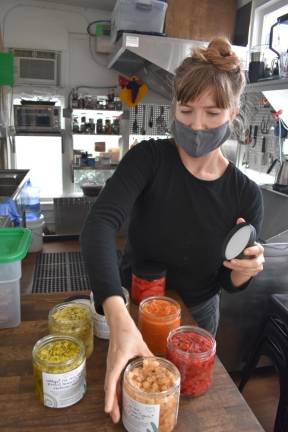
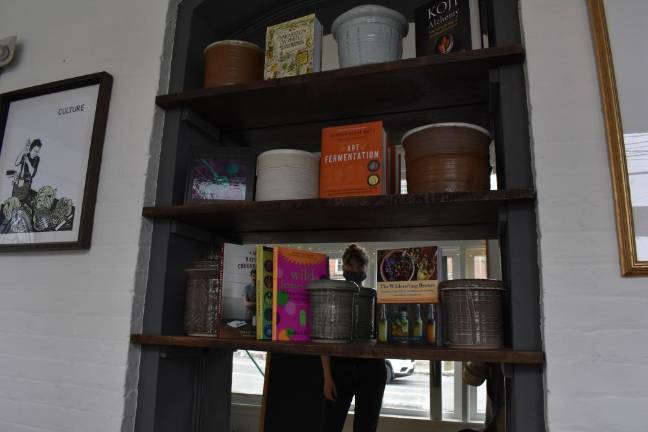
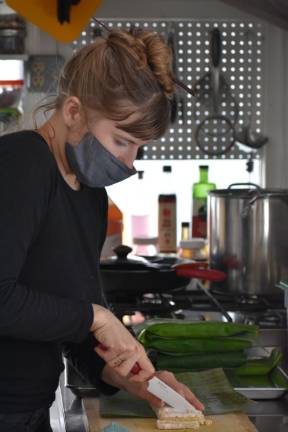
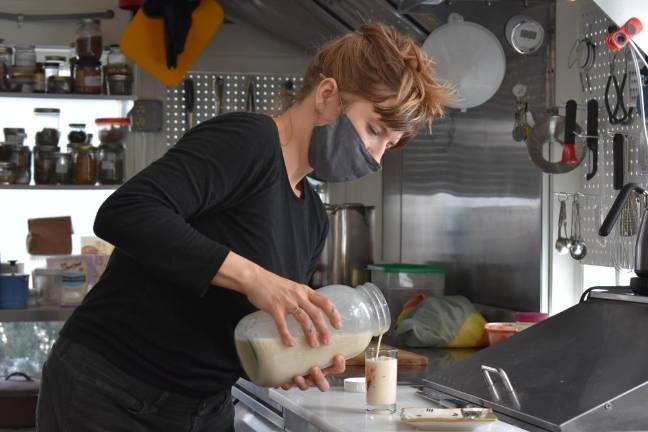
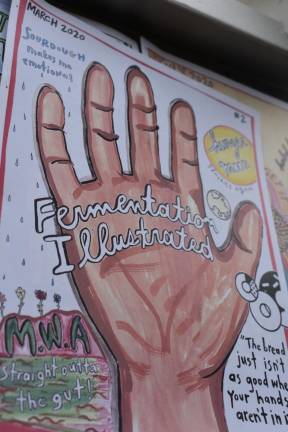
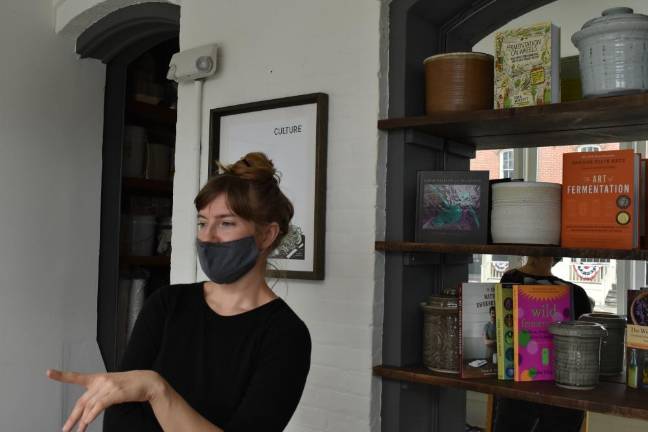
Buy a bus, retrofit it, and travel around the country teaching fermentation. Check. Write a book about it, check. Trek to remote Chinese villages to visit with families clinging to a disappearing way of life, cooking over a fire and using handmade clay pots as fermentation containers. Check. Create, print and distribute a Zine. Check. Start your own café. Check.
What makes her actually do the things that everyone else dreams about, I ask Tara Whitsitt. Is it just fearlessness?
“Maybe it’s a little bit fearlessness,” said Whitsitt, author and illustrator of Fermentation on Wheels: Road Stories, Food Ramblings, and 50 Do-It-Yourself Recipes from Sauerkraut, Kombucha, and Yogurt to Miso, Tempeh, and Mead (2017). “And a little bit, I don’t really know how else I would do what I do, you know?” We are standing in the 24-foot-by-9-foot space that is Drifter Ferments, her soon-to-open café and fermentation shop. Whitsitt is behind the counter, making us tempeh reubens on sourdough with “misonnaise,” or mayo with miso. The $12 sandwich will be a staple of her carefully curated menu. She unwraps two types of house-made tempeh from the banana leaf wraps where they have been fermenting, wrinkling her nose at the “completely ridiculous” idea of wrapping them in plastic, as some people do.
“I really have to create my work if I want to keep doing it, and I have to keep it interesting for others if I want to be successful at it,” she said. There is not exactly an established career ladder for a self-taught artist who’s addicted to fermentation. She gets to – not to mention has to – make it up as she goes. (Among her gigs, Whitsitt wrote for Dirt in 2019 and 2020.)
To max out the space, Whitsitt’s carpenter boyfriend installed reclaimed cedar shelves, atop a custom cut mirror that reflects the brick building across the street and makes the interior feel a little bigger. “It’s a very similar size to my bus,” said Whitsitt. Actually, her 40-foot bus is bigger than her café, but “it has the bus feel.”
That bus – the muse of her book – is parked for now at Earthman Farm in Vernon, NJ. Whitsitt was about to move into an apartment above the café. Then she’d be able to spread out. “Everything is a little shifty right now,” she said, nodding toward the “fermentation closet,” an alcove whose floor is lined with vessels big enough to bathe a toddler. But Whitsitt, whose last decade has been primarily nomadic, is no stranger to a little touch-and-go. The name of her café is a nod to that nimble spirit.
By mid-February, Whitsitt has scraped a quarter-inch layer of grease off of everything and repainted and the place is about ready for its soft launch. The display fridge is chockablock with her trademark ferments, including a turmeric-tinted golden dandy sauerkraut, made with green cabbage from an organic farm in Ithaca and dandelion greens she foraged from the farm where her bus is parked.
Sauerkraut is essentially cabbage and bacteria. Some – like yours truly – find the experience of fermenting sauerkraut in your kitchen over the winter akin to having a long-term houseguest with chronic flatulence. For Whitsitt, it was a revelation.
It was a humble jar of sauerkraut that, over a decade ago, pulled Whitsitt out of her 60-hour workweeks overseeing supply chain management, and launched her onto the winding path that led her here. She spent her early 20s working in the fashion industry, an environment she found isolating and snooty, at a breakneck pace that left her little time to make the art – collages, letters, drawing – that has always bubbled up out of her. “I thought I had to do that because that was just all I knew, really,” she said. Having grown up mostly in Houston, Texas, big city life comprised her experience of the world.
The fall that Occupy swept Wall Street, Whitsitt met a fellow Texan at the Prospect Park farmers market in Brooklyn who became her first fermentation teacher. In the long-neglected kitchen of her Brooklyn apartment, she watched the dark red and green cabbage “transform to magenta and effervescence,” Whitsitt wrote in her book. It felt like tending a tiny garden, and “it made me feel more in tune with a greater community (the bacterial kind).”
Mesmerized by the life force teeming in that jar, “I realized how little I knew about the world outside of the city,” she said. “So I was like, obviously I should leave the city, because I’m not going to learn about that here.”
She made tracks to Oregon, where she joined a small commune. There, she was visited by a dream three nights running of driving a converted bus full of brimful glass jars.
“I fell for it,” she wrote. “My subconscious beckoned me to take the road. I was to spread the gospel of fermented foods, reinvogorate the open-mindedness of time past, challenge myself, and revolutionize the DIY food movement.” She shelled out $6,000 for a converted Michigan State Police bus. Over the next few years she made a name for herself as “the Johnny Appleseed of Pickling,” a nickname bestowed by The New York Times in 2015 when she was camped out for a winter in Queens, in her “dilapidated 1986 International Harvester school bus emitting a faint smell of decay.”
When she once again drove her bus back east a couple years ago, it was with the idea of staying awhile. She was just figuring out what that might look like – themed pop-up dinners at Get Juiced Cafe in Sussex, NJ; teaching a course at Genesis Farm in Blairstown, NJ, on how to make kimchi, mead, fizzies and miso – when the pandemic hit. Her pop-up dinners had been drawing 30 to 40 people, each with a theme corresponding to the new issue of Whitsitt’s hand-drawn zine, Fermentation Illustrated, a copy of which sat at each table. “It felt very renegade,” she said. “I really love that way of being in my work, it’s very unconventional.”
But Covid put the kibosh on just about everything she had going, and it was back to the drawing board. “There was a moment of fear this last year with the pandemic. Not being able to teach, travel, that was really hard,” she said. “What are my next steps? How am I going to grow into this career, and make it totally sustainable so it can live through anything?” she asked herself.
So here we stand at Drifter Ferments, sipping fermented oat milk, a day before she opens her doors for her “sneak preview.” The fermentation process, she explains, unlocks the understated sweetness of the oats. It’s subtly exotic, though aside from heat, time and the Japanese mold koji, the only ingredient is oats grown at an organic farm in central New Jersey.
“The flavors you produce through fermentation, they’re incomparable to any other flavor you can find,” she said. Whitsitt shows me how the tempeh in our reubens is shot through with white specks of fungus mycelium. It is the kind of food you should not wolf down, but I can’t help it.
We eat our reubens side by side, looking out the wall of windows at life meandering past Railroad Green. “This will be the longest I’ve stayed in one place ever, since I was 12, really,” said Whitsitt. “I’m not going anywhere. I’m locked in for at least six years here, and hopefully longer,” she said. Six years is the term of the loan she took out to start the café, but it also feels to her like a reasonable amount of time to stay in one place, building up the deeper level of comfort that comes with familiarity and routine.
Living and working in one place for six years promises to be a serious gear shift for someone who has always heeded the siren song of the open road. “Sheesh y’all, I’m ready,” Whitsitt announced on Drifter’s social media page. “It’s time to lay the tracks for the reality train to roll. This past year has been a bit chaotic. It’s time to build another nest and then be busy AF.”